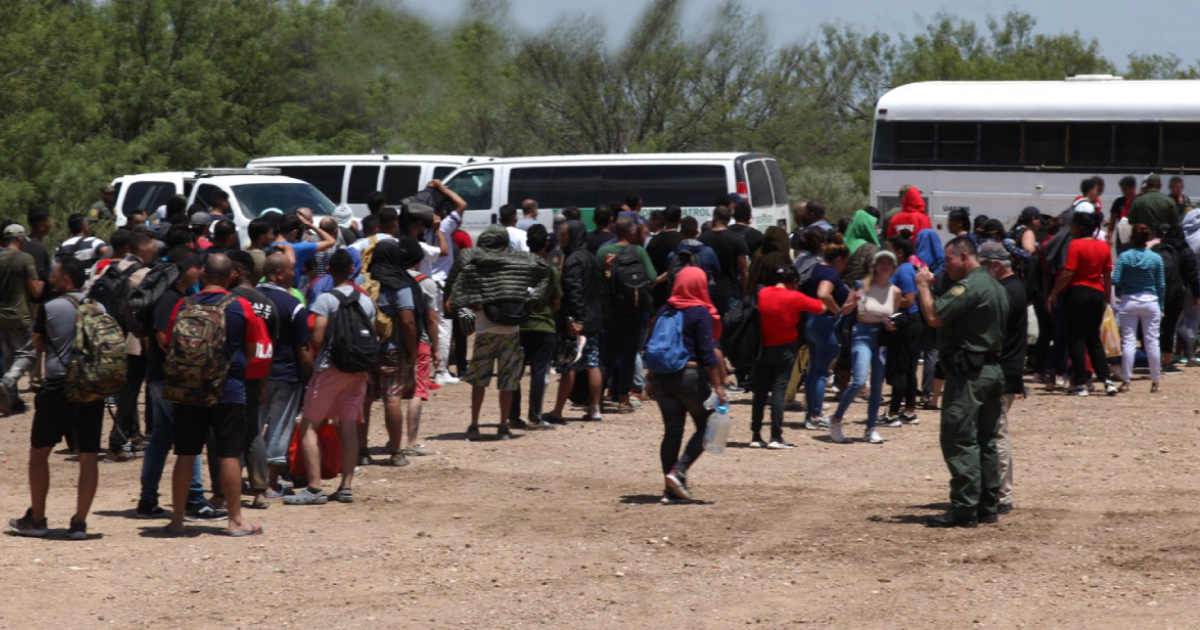
HeArrivals of Cuban migrants at the US-Mexico border decreased drastically in January, after the implementation of the humanitarian parole program by the Joe Biden administration, the Department of Homeland Security (DHS) reported in astatement.
The official note of that entity indicates thatthe arrests of undocumented Cubans, Haitians, Nicaraguans and Venezuelans who attempted to illegally cross the borderdecreased by 97% compared to December.
Although the DHS does not detail the number of Cuban migrants, the average of the four countries representsthe lowest point in illegal immigration since February 2021, precise information.
This drop occurred after President Biden announced aexpanded humanitarian parole program for the citizens of these four countries, to whom it will grant a total of up to 30,000 monthly permits.
According to the statement, the arrivals of immigrants from these four countries decreased bya weekly average of 3,367 daily, on December 11, to a weekly average of only 115, on January 24.
The DHS added that the border closure has also discouraged the arrival of migrants of other nationalities, which have normalized to usual levels after a peak in December.
"These expanded border control measures are working," declared the Secretary of Homeland Security,Alejandro Mayorkas, who was sued this Tuesday along with other members of the Biden administration by twenty Republican states in the United States, which want to annul the humanitarian parole program.
"It is incomprehensible that some states that can benefit from these highly effective enforcement measures are trying to block them and cause more irregular migration at our southern border," Mayorkas added in reference to that lawsuit.
On January 5, President Biden announced additional border control measures to limit illegal immigration, especially of Cubans, whose arrival has increased since 2021 to unsustainable levels.
Last fiscal year224,764 Cubans requested refuge on the country's land borders and only in December the figure reached a historical peak for a month, with42,637 registered requests, according to official statistics.
In total, at all border points,the number of Cubans rose to 44,064 in the last month of 2022, according to the report from the Department of Customs and Border Protection (DHS/CBP) released on Friday.
The figures also indicate that during the first quarter of fiscal year 2023, which began last October 1, the number of Cubans arriving in the United States rose to 109,823, a stampede that illustrates the magnitude of the largest irregular exodus from the island in the last six decades.
Biden's plan, "to limit illegal immigration, expands safe, legal and orderly ways to reach the United States and, where appropriate, present requests for protection, with new consequences for those who do not take advantage of these ordered ways," Mayorkas defended. .
He explained that this protocol and the consequent decrease in the arrival of immigrants to the southern border has shown that "when there is a legal and orderly route, people feel less inclined to put their lives in the hands of smugglers."
"The new measures are based on the successful model previously used for people fleeing Venezuela, Ukraine and Afghanistan. Since the parole program for Venezuelan citizens was announced, the number of people from Venezuela attempting to enter illegally The United States has continued to decline significantly," he recalled.
He said Venezuelan levels were low even in December, when there was a slight increase after "smugglers spread misinformation around the Title 42 public health order."
"The number of Venezuelans found on the southwest border has decreased from about 1,100 a day, the week before the announcement of the [humanitarian parole] process, to an average of 100 a day in January," he revealed.
The statistics on specific entries by Cubans will be detailed by DHS later. The official DHS/CBP reports are released two weeks after the end of the month.
What do you think?
SEE COMMENTS (1)Filed in: